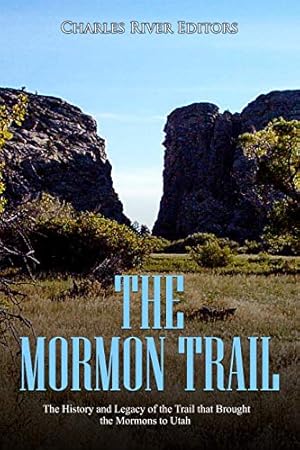The Mormon Trail: The History and Legacy of the Trail that Brought the Mormons to Utah
Share This
Description
*Includes pictures
*Includes excerpts of contemporary accounts
*Includes a bibliography for further reading
*Includes a table of contents
Among all the various figures in 19th century America who left controversial legacies, it is hard to find one as influential as Joseph Smith (1805-1844), the founder of The Church of Jesus Christ of Latter-Day Saints, Mormonism, and the Latter-Day Saint movement. Revered as a prophet on the level of Moses by some, reviled as a perpetrator of large-scale fraud by others, what everyone can agree on is that Joseph Smith founded a religious movement that played a crucial role in the settlement of the West, especially in Utah.
Smith's dream of Zion would lead the way for the trials and the tribulations of the Mormons for the rest of the 19th century, including countless conflicts with local authorities and the U.S. government. Smith himself would be a casualty of the clashing, murdered by a mob in 1844 after being imprisoned in Carthage, Illinois near the settlement of Nauvoo, which Smith had painstakingly tried to create as a commune for his people.
Smith's death was one of the catalysts for the Mormons' great migration to Utah, and today that state and the Mormons are virtually synonymous. To this day, Mormons still form a majority of the population, and members of the Church have prominent political and economic roles. Both of Utah's U.S. Senators, Mike Lee and Mitt Romney, are Mormons, as is Governor Gary Herbert. The story of the Mormon pioneers and the trail they trod is one of the great stories of the westward expansion of the United States. Frenchman Hyppolite Taine wrote of the migration in romantic terms in the 1860s: "Since the exodus of the Israelites there is no example of so great a religious emigration executed across such great spaces in spite of such obstacles, by so great a number of men, with so much order, obedience, courage, patience, and devotion..But the mainsprings of this great will was faith. Without it men would not have done such things. These exiles thought that they were founding the city of God, the metropolis of mankind. They considered themselves the renovators of the world. Let us remember our youth, and with what force an idea... merely by the fact that it seems good and true to us hurls us forward despite natural egotism, daily weakness, habits that we have contracted, surrounding prejudices, and accumulated obstacles! We don't know of what we are capable."
Stanley Kimball pointed out the "curious fact" that the Mormons, "who did not want to go west in the first place, were among the most successful in doing so." He noted, "Mormons, in as much as they did not go west for a new identity, missionary work, adventure, furs, land, health, or gold, but were driven beyond the frontier for their religious beliefs, were not typical westering Americans. While their trail experience was similar to other westering Americans, their motivation was different. It hardly seems necessary to document such a well known fact, but it will be helpful, in this respect, to refer to the city of Nauvoo, Illinois, itself. It was not a typical frontier community, nor did it resemble other frontier communities peopled by those pushing west. Nauvoo, rather, resembled an established New England city. It contained the many brick and substantial frame homes of people intending to remain, not the temporary log cabins of people on the move. The pioneer group was not concerned with just getting themselves safely settled, but with making the road easier for others of their faith to follow. Furthermore, the Mormons moved as villages on wheels, transplanting an entire people, rather than isolated, unrelated groups as was the case with the Oregon and California migrations... "
Tag This Book
This Book Has Been Tagged
Our Recommendation
Notify Me When The Price...
Log In to track this book on eReaderIQ.
Track These Authors
Log In to track Charles River Editors on eReaderIQ.

